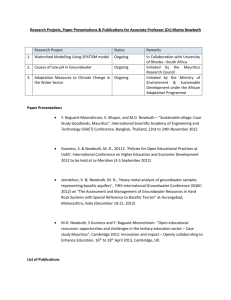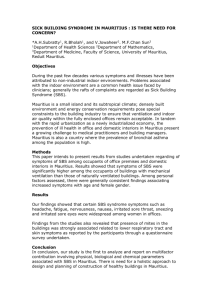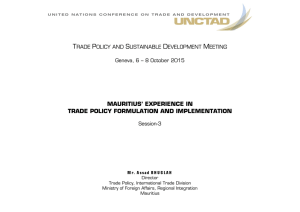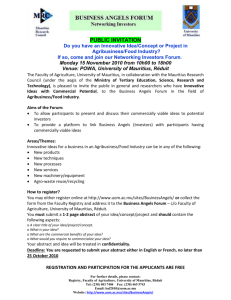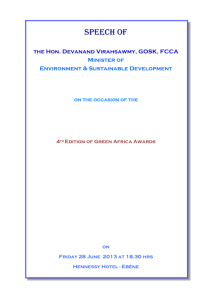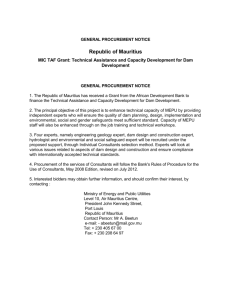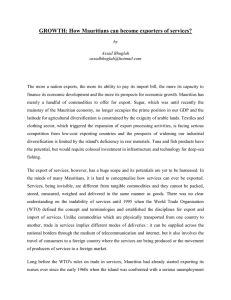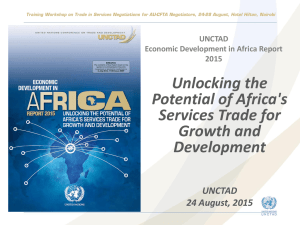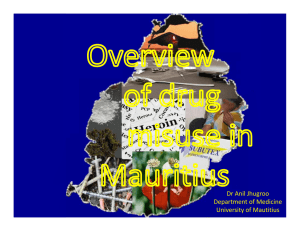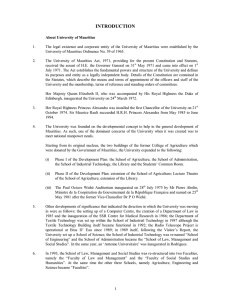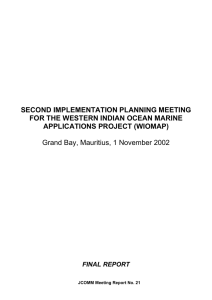REGIONAL MEETING ON PROMOTING SERVICES SECTOR DEVELOPMENT AND TRADE-LED GROWTH... AFRICA
advertisement
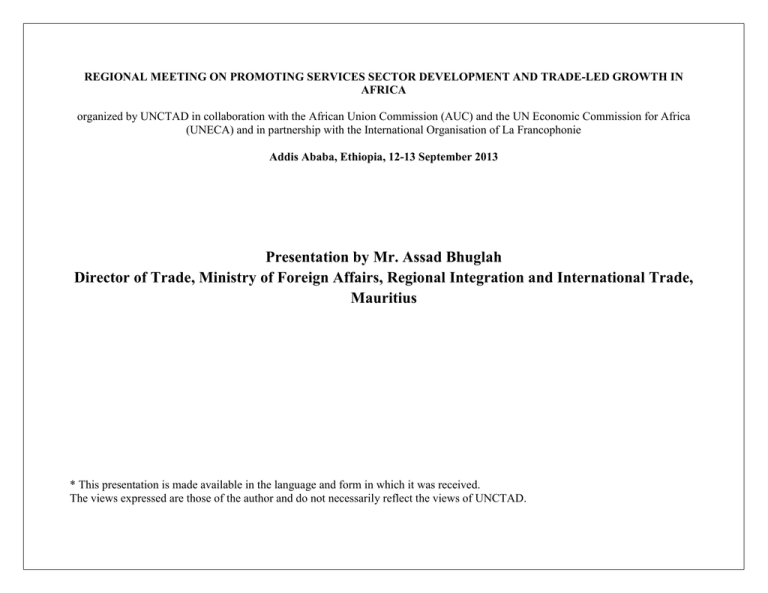
REGIONAL MEETING ON PROMOTING SERVICES SECTOR DEVELOPMENT AND TRADE-LED GROWTH IN AFRICA organized by UNCTAD in collaboration with the African Union Commission (AUC) and the UN Economic Commission for Africa (UNECA) and in partnership with the International Organisation of La Francophonie Addis Ababa, Ethiopia, 12-13 September 2013 Presentation by Mr. Assad Bhuglah Director of Trade, Ministry of Foreign Affairs, Regional Integration and International Trade, Mauritius * This presentation is made available in the language and form in which it was received. The views expressed are those of the author and do not necessarily reflect the views of UNCTAD. By Mr. Assad Bhuglah-Director Trade Policy Ministry of Foreign Affairs, Regional Integration, International Trade 1970 - post-Independence deal with the private sector to invest the surplus income from sugar export into tourism – primary objective was to address mass unemployment problem. 1994 – instigation of the WTO – submit a token commitment in services in order to become founder member of the WTO – commitments made in tourism and telecommunication. Exemption filed in Financial Services without making any commitment in this sector. 1995- first Trade Policy Review of Mauritius – call for rectifying the inconsistencies in the extended negotiations in telecommunications and financial services. Vulnerability of Mauritius due to mono-crop (sugar) and mono-manufacturing (textile and clothing) relying heavily on EU preferentials Mid 2000 – the EU preferences challenged in the WTO – Multi-Fibre arrangements phased out and price depression for sugar. Diversifying towards services. Putting in place regulatory and institutional frameworks - Financial Services Commission - ICTA _ Tourism Authority Cyber-island concept – investment in IT infrastructure Knowledge-based economy – massive investment in education Bilateral deals with France, Canada and Seychelles for circular migration Regional initiative for trade in services agreement at SADC and COMESA level A network of IPPAs and DTAs Setting up a special unit at Ministry of Trade to ensure coordination and policy coherence among multi-stakeholders. Capacity-building of officials and education process of the stakeholders. Joint public – private sector consultation mechanism. Enlisting the support of UNCTAD and Commonwealth Secretariat for undertaking situational analysis and Needs Assessment Mobilising expertise from professional bodies, services lobbies and private sector in preparation of Country Report on services – CAPAS exercise Involvement of private sector experts in services negotiations A small island, geographically isolated from the African mainland Mauritius is absent from the land transport, energy and mining services. Its national airline does not have the clout to compete with the mega airlines. Its home-grown construction firms are too small to position themselves on the regional market. Limited participation of Mauritius in infrastructure intensive services. Relaxing the pressure on endowment – intensive services (tourism) and moving towards knowledge-intensive services. Compensating the insignificant commercial presence of Mauritian firms abroad, by diversifying products of mode 2 (health-tourism, educational hub), intensifying the mode 1 delivery (call centres, Business Process Outsourcing backward office operations) and upgrading the mode 4 exports (circular migration of professionals and skilled persons) Connectivity – Eassy submarine cable, modernisation of airport, gradual opening of the sky, relaxation of entry visa to most of the African nations Regulatory Reforms Special schemes to encourage now categories of tourists (honey-mooners, film-makers and foreign students) Enlarging circle of opportunities for higher education and specialised training by encouraging reputed foreign universities to install branches in Mauritius. Strategic partnership with foreign medical institutions in the field of heart-surgery, cancer treatment, cornea transplant and vitro-retinal operations. Adding new products to financial services (e.g Islamic Banking) Trade in Services at multilateral level will take a long time to generate the desired results due to the continued deadlock of the Doha Round talks In the interim the regional route can serve as an important platform to provide training ground for developing countries to develop the services sectors. Mauritius is an active player for the promotion of trade in services in the context of SADC and COMESA Despite the conclusion of services agreement at regional level, there seems to exist lack of preparedness and capacity-deficit among African countries to embark on trade liberalisation programmes. Cognisant of this reality, Mauritius had been one of the proponents of variable geometry and multi-speed approach during the negotiations of SADC Trade Protocol. As such, two or more members of SADC, if they wish to move on fast-track, can negotiate to liberalise trade in services for specific sectors. Other members who would wish to join them at a later stage, can do so but on the basis of exchanging preferences on reciproca basis. The Protocol should not prevent a SADC member from entering into a new preferential agre12ement with third countries provided other member states would be afforded the opportunity to negotiate similar preferences in reciprocal basis. Thank You
